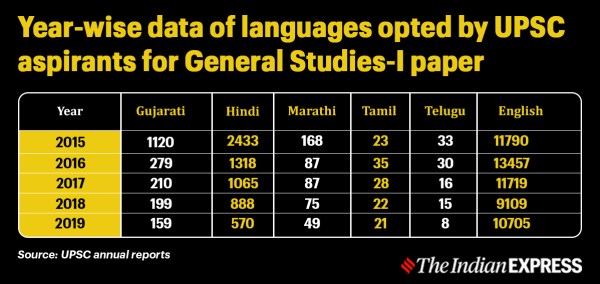In 2013, the Union Public Service Commission (UPSC) announced that English will no longer be compulsory to write Civil Services Exam (CSE), and that candidates can choose any one of the regional languages under Schedule 8 for written exams and interviews. Data, however, suggest that English is still the most preferred language for aspirants.
As per the UPSC annual report 2015-16, of the 1,4605 candidates who appeared in the 2015 CSE Main examination, 1,1790 opted for English for General Studies-I, followed by 2,433 for Hindi and the remaining opted for any of the 22 regional languages. Similarly, in 2016, a total of 15,107 had appeared in the main exam. As many as 13,457 candidates wrote the General Studies-I exam in English and only 1318 in Hindi.
The disparity in the languages opted by the UPSC aspirants continues in other papers also including General Studies-II, General Studies-III, General Studies-IV and essays. The report added that of the 86 candidates, who opted for Agriculture-I as their optional subject in 2015, 84 wrote the exam in English and only 2 opted for Hindi.
In 2017, a total of 13,031 candidates appeared for the main exam, of which 11,719 opted for English for General Studies-I and only 1,065 opted for Hindi – even lesser than the previous two years. Based on the data available in the UPSC annual report 2018-19, the number of qualifying candidates dipped to 10,227 in 2018 and consequently, those who took Hindi as their preferred language for the exam also decreased to 888 while 9109 candidates wrote the exam in English. Besides, only 1 candidate wrote the exam in Urdu.

Limited study material in regional languages
In CSE 2020, 28-year old Asim Khan Khifayat became the first candidate to qualify the exam in Urdu.
“The major problem with regional languages is the availability of learning material as most of it is only in English. However, I prepared for my exam through NCERT books, which are available in Urdu, PIB releases and Yojana magazine. Clearing UPSC takes a lot of effort and if half of the time is spent in finding or translating the learning material, it impacts your preparation,” says Asim, who completed his engineering degree from North Maharashtra University in Dhule and cleared the CSE in his third attempt this year.
In 2018 and 2019, the number of candidates opting for Urdu increased to three but English continued to be the most preferred language with more than 9,000 (of a total 10,222) opting to take GS-I in English in 2019 and 10,705/11448 in 2019.
In 2017 and 2018, not even a single candidate chose to take any compulsory papers in Kashmiri, Sindhi, Konkani, Manipuri, Dogri and Santhali. The trend continued in 2018 and 2019 but as opposed to previous years, one candidate wrote the Indian Languages paper in Dogri.
In 2011, the Civil Services Aptitude Test (CSAT) was introduced in the CSE to evaluate candidates’ comprehension, communication and decision-making skills, But that too tested candidates’ fluency with English only.
Role of English-medium schools and colleges
Radhika Gupta, who achieved AIR 18 in UPSC CSE 2018, says that the language of instruction in school and college also plays an important role as “most candidates who opt for regional languages are often not from English-medium school”.
“I have always studied in an English-medium school and it will naturally be my first choice. It builds your mental capacity to think, write and talk in English. Most coaching centres, online learning, material and even books are easily available in English, whereas the case is not the same for regional languages,” says Radhika, a native of a tribal district of Madhya Pradesh.
English continues to rule interview rounds
Out of 2,792 candidates who appeared for the personality test (PT) in CSE 2015, 2,368 opted English while 429 candidates opted for an Indian Language as a medium for interview. In 2019 too, of the total 1,992 candidates who competed in the personality test round, 1,774 opted for English and only 250 for Hindi. Candidates who opted for Hindi for PT in 2018 were 297 out of 2,564.
Ankur Lahoty, who cleared UPSC CSE in 2015 and is currently serving as the deputy director of (media) PIB, Ministry of Family and Health, says that the language trend in interviews is a reflection of English being an aspirational language.
“Aspirants refer to only a few newspapers to be up-to-date with the current affairs and prepare for the interview and these include English dailies such as The Indian Express and The Hindu. Since they are preparing in English for the written exam, they do not want to incur any translation losses by opting for a regional language in interviews. Hence, English becomes their comfort zone,” he says.
Another reason, Ankur adds, is the misconception among candidates that regional languages have a lesser success rate. “Aspirants feel that if they choose Hindi or any other language, they will be treated differently. However, every language is the same for the commission and it only depends on their preparation,” he says.
Source link
